
|
Kann ein Mensch dabei untätig bleiben?Arakchiyska, Iva : Kann ein Mensch dabei untätig bleiben? : Hilfe für verfolgte Juden in Bulgarien 1940-1944 Während er deutsche Offiziere im Militärkrankenhaus behandelte, erfuhr der bulgarische Arzt Dr. Pavel Gerdjikov von den Deportationsplänen der bulgarischen Regierung. Zwar nahm er die Rolle des vertrauenswürdigen Arztes mit exzellenten Deutschkenntnissen ein, doch er verachtete den Antisemitismus und die NS-Ideologie zutiefst. Acht Monate lang versteckte er eine befreundete jüdische Familie in seiner Wohnung, fälschte Personalausweise, stahl Formulare bei der Polizei und rettete jüdische Kinder aus Deportationszügen. Pavel Gerdjikov war einer von vielen mutigen Menschen, die Hilfe für verfolgte Juden in Bulgarien leisteten, jedoch wurden bisher nur wenige Fälle dokumentiert und veröffentlicht. Neun ganz unterschiedliche Geschichten über Hilfsaktionen für Juden in Bulgarien wurden für die vorliegende Publikation rekonstruiert und können somit zum ersten Mal einer breiten Öffentlichkeit vorgestellt werden. Sie zeigen Aspekte der antijüdischen Politik Bulgariens in den Jahren 1940 bis 1944 und machen die Geschichte greifbar. Anschaulich vermitteln sie einen Eindruck von der breiten zivilgesellschaftlichen Solidarität mit den Juden. Die historischen Fakten um Bulgariens Beteiligung am Zweiten Weltkrieg und an der Judenverfolgung sind in Westeuropa noch wenig bekannt: Im Unterschied zu den meisten europäischen Ländern fiel die einheimische jüdische Bevölkerung dem Holocaust nicht zum Opfer, obwohl das Land ein freiwilliger Kriegsverbündeter von Deutschland war. Die bulgarischen Juden überlebten, dagegen wurde in den von Bulgarien okkupierten Gebieten die gesamte jüdische Bevölkerung unter Aufsicht der bulgarischen Behörden deportiert und ermordet - zwei Kapitel der Geschichte, die nicht gegensätzlicher sein könnten. (Verlagstext) Hinzugefügt am 27.11.2025
|

|
Out of the USSRHausbacher, Eva ; Parente-Čapková, Viola ; Rosenholm, Arja : Out of the USSR : travelling women - travelling memories This book examines how women authors recall their own and their families’ past lives after having emigrated from the Soviet Union in the 1990s, and how they reflect on their new country of residence, be it Germany, Austria, Israel, USA, or Finland, among others. The chapters connect migration, memory, and gender studies to analyse literary presentations created by these "travelling" women. The aim of the book is to pay attention both to women’s contribution to cultural transfer, and to the mobility of memories: for the first time, it brings women’s narratives as a form and tool to work through both individual and collective traumas to the forefront, remedying a long-standing omission in Russian and post-Soviet migration history. At the same time, the volume looks at "travelling" memories and cultural traumas from a gendered perspective: what happens when the recollections of women’s traumatic experiences of Soviet history travel through time and space? As this volume argues, narratives by women who left the Soviet Union often call into question official accounts of Soviet history, and rewrite them in a way that makes room for gendered lived experience. (Verlagstext) Hinzugefügt am 20.11.2025
|

|
Russia in FlamesEngelstein, Laura : Russia in Flames : War, Revolution, Civil War : 1914-1921 October 1917, heralded as the culmination of the Russian Revolution, remains a defining moment in world history. Even a hundred years after the events that led to the emergence of the world's first self-proclaimed socialist state, debate continues over whether, as historian E. H. Carr put it decades ago, these earth-shaking days were a "landmark in the emancipation of mankind from past oppression" or "a crime and a disaster." Some things are clear. After the implosion of the three-hundred-year-old Romanov dynasty as a result of the First World War, Russia was in crisis--one interim government replaced another in the vacuum left by imperial collapse. In this monumental and sweeping new account, Laura Engelstein delves into the seven years of chaos surrounding 1917--the war, the revolutionary upheaval, and the civil strife it provoked. These were years of breakdown and brutal violence on all sides, punctuated by the decisive turning points of February and October. As Engelstein proves definitively, the struggle for power engaged not only civil society and party leaders, but the broad masses of the population and every corner of the far-reaching empire, well beyond Moscow and Petrograd. (Verlagstext) Hinzugefügt am 30.10.2025
|

|
The burden of the pastGłowacka-Grajper, Małgorzata : The burden of the past : history, memory, and identity in contemporary Ukraine In a century marked by totalitarian regimes, genocide, mass migrations, and shifting borders, the concept of memory in Eastern Europe is often synonymous with notions of trauma. In Ukraine, memory mechanisms were disrupted by political systems seeking to repress and control the past in order to form new national identities supportive of their own agendas. With the collapse of the Soviet Union, memory in Ukraine was released, creating alternate visions of the past, new national heroes, and new victims. This release of memories led to new conflicts and "memory wars." How does the past exist in contemporary Ukraine? The works collected in The Burden of the Past focus on commemorative practices, the politics of history, and the way memory influences Ukrainian politics, identity, and culture. The works explore contemporary memory culture in Ukraine and the ways in which it is being researched and understood. Drawing on work from historians, sociologists, anthropologists, psychologists, and political scientists, the collection represents a truly interdisciplinary approach. Taken together, the groundbreaking scholarship collected in The Burden of the Past provides insight into how memories can be warped and abused, and how this abuse can have lasting effects on a country seeking to create a hopeful future. (Verlagstext) Hinzugefügt am 22.10.2025
|

|
Moskaus westliche RivalenSchmitt, Oliver Jens : Moskaus westliche Rivalen : eine europäische Geschichte vom Nordkap bis zum Schwarzen Meer Die große Geschichte der Nachbarn Russlands - vom Mittelalter bis zur Gegenwart neu erzählt Hinzugefügt am 9.10.2025
|

|
The last peasant warBeneš, Jakub S. : The last peasant war : violence and revolution in twentieth-century Eastern Europe As the First World War ended, villages across central and eastern Europe rose in revolt. Led in many places by a shadowy movement of army deserters, peasants attacked those whom they blamed for wartime abuses and long years of exploitation—large estate owners, officials, and merchants, who were often Jewish. At the same time, peasants tried to realize their rural visions of a reborn society, establishing local self-government or attempting to influence the new states that were being built atop the wreckage of the Austro-Hungarian and Russian Empires. In The Last Peasant War, Jakub Beneš presents the first comprehensive history of this dramatic and largely forgotten revolution and traces its impact on interwar politics and the course of the Second World War. Hinzugefügt am 2.10.2025
|

|
Serbia : a modern historyHoare, Marko Attila: Serbia : a modern history This is the first in-depth, English-language history of modern Serbia in nearly half a century. It covers the period from the Serbian state’s revolutionary rebirth in the early nineteenth century, under the rebel leaders Karađorđe Petrović and Miloš Obrenović; its turbulent history of wars, uprisings and dynastic rivalries; the triumph of Yugoslav unification in 1918; and the catastrophe of occupation by Nazi Germany in 1941. It shows how the birth of the modern nation-state involved the creation of a new elite—dynasty, army and bureaucracy—whose rule over the peasantry generated a popular resistance that would ultimately take form in Nikola Pašić’s mighty People’s Radical Party. The resulting struggle between elitist Westernizers and pro-Russian populists became entwined with the struggle for pan-Serb and Yugoslav liberation and unification. These causes came together with the Sarajevo assassination of 1914, which triggered the First World War. Existing histories of the Yugoslav kingdom that emerged from that war focus on the national conflict between Serbs, Croats, Bosnian Muslims and others, but Marko Attila Hoare challenges this narrative. He shows how the new kingdom’s politics continued to be dominated by the ongoing internal Serbian power struggle, bringing renewed disaster to Yugoslavia and its peoples. (Zusammenfassung) Hinzugefügt am 9.09.2025
|

|
Sonderzug nach Moskau : Geschichte der deutschen Russlandpolitik seit 1990Scianna, Bastian Matteo: Sonderzug nach Moskau : Geschichte der deutschen Russlandpolitik seit 1990 Bastian Matteo Scianna hatte Zugang zu unbekanntem Archivmaterial aus dem In- und Ausland, unter anderem zu den Akten des Kanzleramts unter Helmut Kohl, zu den Protokollen der CDU/CSU-Bundestagsfraktion oder Gesprächsmitschriften aus britischen und amerikanischen Quellen. Seine grundlegende Analyse zeigt, dass die Geschichte viel komplexer ist als manchmal dargestellt. Die deutsch-russischen Beziehungen waren besonders und genossen einen hohen Stellenwert. Es fuhr daher ein Sonderzug nach Moskau. Doch stand die Bundesrepublik in Europa keineswegs allein und war nicht nur "blind und naiv", wie manche Kritiker behaupten. Andere Länder glaubten ebenfalls an «Wandel durch Handel» und wollten mit Russland zusammenarbeiten: Die "Utopie der Verflechtung" war keinesfalls ausschließlich Made in Germany. Auch andernorts folgte man internationalen Interessen und erkannte zugleich die Grenzen des eigenen Einflusses auf die Entscheidungen des Kremls. Dass Deutschland heute so stark in der Kritik steht, ist trotzdem teilweise gerechtfertigt: Denn man hatte keinen Plan B und keine Strategie für den Ernstfall. Die Bundeswehr verkümmerte. Die Ukraine wurde nicht aufgerüstet. Dialog, Entspannung und Einbindung waren noble Versuche, die aber ohne eine glaubwürdige Abschreckungspolitik in der Luft hingen und am Ende zusammen mit energiepolitischen Irrwegen die Sicherheit Europas gefährdeten. (Verlagstext) Hinzugefügt am 26.08.2025
|

|
Becoming Soviet Jews : the Bolshevik experiment in MinskBemporad, Elissa : Becoming Soviet Jews : the Bolshevik experiment in Minsk Minsk, the present capital of Belarus, was a heavily Jewish city in the decades between the world wars. Recasting our understanding of Soviet Jewish history, Becoming Soviet Jews demonstrates that the often violent social changes enforced by the communist project did not destroy continuities with prerevolutionary forms of Jewish life in Minsk. Using Minsk as a case study of the Sovietization of Jews in the former Pale of Settlement, Elissa Bemporad reveals the ways in which many Jews acculturated to Soviet society in the 1920s and 1930s while remaining committed to older patterns of Jewish identity, such as Yiddish culture and education, attachment to the traditions of the Jewish workers' Bund, circumcision, and kosher slaughter. This pioneering study also illuminates the reshaping of gender relations on the Jewish street and explores Jewish everyday life and identity during the years of the Great Terror. (Verlagstext) Hinzugefügt am 11.08.2025
|

|
Ukraine-Studien : EinführungPortnov, Andrii: Ukraine-Studien : Einführung Der Band bietet die erste umfassende Einführung in die Ukraine-Studien in deutscher Sprache. Er behandelt Geschichte und Gegenwart der Ukraine in vergleichender Perspektive. Anschaulich und verständlich wird in die wichtigsten Probleme der ukrainischen Geschichte und Politik sowie in Literaturen, Medien, Sprachen und konfessionelle Fragen eingeführt. Das Buch ist eine Synthese der internationalen Forschung, aber auch das Ergebnis der eigenen Forschungs- und Lehrerfahrung des Autors in ganz Europa. Es richtet sich an Studierende und Lehrende der Ukraine- und Osteuropastudien, der Slawistik sowie an Journalist:innen, Politiker:innen und alle am östlichen Europa Interessierten. (Verlagstext) Hinzugefügt am 4.08.2025
|

|
Strategy and power in Russia 1600-1914Fuller, William C. Jr. : Strategy and power in Russia 1600-1914 A compelling examination of Russia's national strategy from the founding of the Romanov dyansty to World War I delving into military strategies, political power dynamics, and the historical evolution of one of the world’s most influential nations. Historian William C. Fuller Jr. expertly breaks down and studies an incredibly important section of Russia's complex military history, spanning from the founding of the Romanov dysnasty in the early 17th century to the brink of World War I. Focusing on the ways in which tsarist statesmen and governments tried to employ force or the threat of force to achieve their political objectives over roughly three hundred years, this book is a study of high military strategy, the connection between military means and political ends. Fuller discusses the ways in which Russian strategic tradition adapted—and failed to adapt—to challenges of geography, demographics, poverty, and technological change. Built through warfare and conquest, the military strategies left an indelible imprint on Russian society, economy, and government. Understanding the history of imperial Russian strategy can shed light on more modern and urgent concerns, and even help while considering the future. A knowledge of imperial military history is more pertinent than ever to understand the transformation of Russia and its miltary. (Verlagstext) Hinzugefügt am 28.07.2025
|

|
Anti-Jewish violence : rethinking the Pogrom in East European HistoryDekel-Chen, Jonathan et. al.: Anti-Jewish violence : rethinking the Progrom in East European history, Although overshadowed in historical memory by the Holocaust, the anti-Jewish pogroms of the late 19th and early 20th centuries were at the time unrivaled episodes of ethnic violence. Incorporating newly available primary sources, this collection of groundbreaking essays by researchers from Europe, the United States, and Israel investigates the phenomenon of anti-Jewish violence, the local and transnational responses to pogroms, and instances where violence was averted. Focusing on the period from the First World War until the first decades of Soviet Russia, the studies include Poland, Ukraine, Belorussia, Lithuania, Crimea, and Siberia. (Verlagstext) Hinzugefügt am 21.07.2025
|

|
Venice and the Dalmatian Hinterland : Spalato, Poglizza, Almissa and ClissaSadovski, Lena: Venice and the Dalmatian Hinterland : Spalato, Poglizza, Almissa and Clissa (Late 15th - Early 16th Century) This volume offers a source-based analysis of the complex interactions between the Venetian administration of the coastal town Spalato (Split) and its hinterland under Venetian, Hungarian, and Ottoman rule. Employing a microhistorical approach, Sadovski studies the military importance, economic dynamics, and social changes in the Dalmatian hinterland in the later medieval period. This book also explores multilingualism, highlighting how Slavic languages as well as local laws and customs were integrated into the Venetian administration. In doing so, it broadens our understanding of the Venetian maritime empire and proposes a new way of thinking about hinterlands - in cultural, social, linguistic, and legal terms alongside economic and political aspects. (Verlagstext) Hinzugefügt am 14.07.2025
|
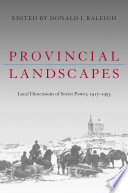
|
Provincial landscapes : local dimensions of sovjet power, 1917-1953Donald Raleigh: Provincial landscapes : local dimensions of sovjet power, 1917-1953, Pittsburgh : University of Pittsburgh Press The closed nature of the Soviet Union, combined with the WestÆs intellectual paradigm of Communist totalitarianism prior to the 1970s, have led to a one-dimensional view of Soviet history, both in Russia and the West. The opening of former Soviet archives allows historians to explore a broad array of critical issues at the local level. Provincial Landscapes is the first publication to begin filling this enormous gap in scholarship on the Soviet Union, pointing the way to additional work that will certainly force major reevaluations of the nationÆs history.Focusing on the years between the Revolution and StalinÆs death, the contributors to this volume address a variety of topics, including how political events and social engineering played themselves out at the local level; the construction of Bolshevik identities, including class, gender, ethnicity, and place; the Soviet cultural project; and the hybridization of Soviet cultural forms. In showing how the local is related to the larger society, the essays decenter standard narratives of Soviet history, enrich the understanding of major events and turning points in that history, and provide a context for the highly visible socio-political and cultural role individual Russian provinces began to play after the breakup of the Soviet Union. (Verlagstext) Hinzugefügt am 19.02.2025
|
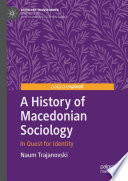
|
A history of Macedonian sociology : in quest for identityNaum Trajanovski: A history of Macedonian sociology : in quest for identity, Cham : Springer Nature Switzerland : Imprint: Palgrave Macmillan, [2024] This book is the first English-language monograph about the institutional development of sociology in (North) Macedonia. It maps and discusses the contexts, goals, and merits of the pioneering attempts for sociological research in the interwar period, early post-war educational and publishing politics, the institutionalization of sociology in socialist Macedonia in the course of the 1960s, its cross-national exchanges, as well as its major trajectories and debates up until the present days. Against the backgrounds of the political and intellectual histories of Yugoslav and post-Yugoslav Macedonia, it argues that the development of the sociological activities, themes, and arguments is entwined with the Macedonian nation- and state-building. (Verlagstext) Hinzugefügt am 19.02.2025
|

|
Jozef Pilsudski : Founding Father of Modern PolandJoshua D. Zimmerman: Jozef Pilsudski : Founding Father of Modern Poland, Cambridge, MA : Harvard University Press, [2022] The story of the enigmatic Jozef Pilsudski, the founding father of modern Poland: a brilliant military leader and high-minded statesman who betrayed his own democratic vision by seizing power in a military coup. In the story of modern Poland, no one stands taller than Jozef Pilsudski. From the age of sixteen he devoted his life to reestablishing the Polish state that had ceased to exist in 1795. Ahead of World War I, he created a clandestine military corps to fight Russia, which held most Polish territory. After the war, his dream of an independent Poland realized, he took the helm of its newly democratic political order. When he died in 1935, he was buried alongside Polish kings. Yet Pilsudski was a complicated figure. Passionately devoted to the idea of democracy, he ceded power on constitutional terms, only to retake it a few years later in a coup when he believed his opponents aimed to dismantle the democratic system. Joshua Zimmerman’s authoritative biography examines a national hero in the thick of a changing Europe, and the legacy that still divides supporters and detractors. The Poland that Pilsudski envisioned was modern, democratic, and pluralistic. Domestically, he championed equality for Jews. Internationally, he positioned Poland as a bulwark against Bolshevism. But in 1926 he seized power violently, then ruled as a strongman for nearly a decade, imprisoning opponents and eroding legislative power. In Zimmerman’s telling, Pilsudski’s faith in the young democracy was shattered after its first elected president was assassinated. Unnerved by Poles brutally turning on one another, the father of the nation came to doubt his fellow citizens’ democratic commitments and thereby betrayed his own. It is a legacy that dogs today’s Poland, caught on the tortured edge between self-government and authoritarianism. (Verlagstext) Hinzugefügt am 19.02.2025
|
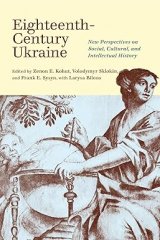
|
Eighteenth-century UkraineZenon E.Kohut, Volodymiyr Sklokin,Frank E.Sysyn (eds.): Eighteenth-century Ukraine : new perspectives on social, cultural, and intellectual history, Montreal : McGill-Queen's University Press, [2023] In 1648, the Cossack revolution of Eastern Europe established a new social and political order that endured until the early nineteenth century. Eighteenth-Century Ukraine provides an innovative reassessment of this crucial period and reflects new developments in the study of eighteenth-century Ukrainian social and cultural history. (Verlagstext) Hinzugefügt am 21.05.2024
|
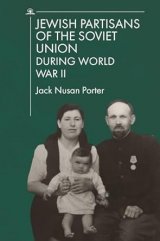
|
Jewish Partisans of the Soviet Union during World War IIYehuda Merin, Jack Nusan Porter (ed.): Jewish Partisans of the Soviet Union during World War II, Boston, MA : Academic Studies Press, [2021] Jewish Partisans of the Soviet Union is a classic compilation of original Russian and Jewish sources on the anti-Nazi resistance in Eastern Europe. Hinzugefügt am 21.05.2024
|
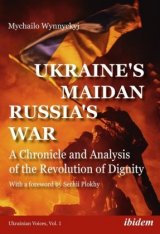
|
Ukraine's maidan, Russia's warMychailo Wynnyckyj: Ukraine's maidan, Russia's war : a chronicle and analysis of the revolution of dignity, Stuttgart : Ibidem Press, [2019] In early 2014, sparked by an assault by their government on peaceful students, Ukrainians rose up against a deeply corrupt, Moscow-backed regime. Initially demonstrating under the banner of EU integration, the Maidan protesters proclaimed their right to a dignified existence; they learned to organize, to act collectively, to become a civil society. Most prominently, they established a new Ukrainian identity: territorial, inclusive, and present-focused with powerful mobilizing symbols. Driven by an urban "bourgeoisie" that rejected the hierarchies of industrial society in favor of a postmodern heterarchy, a previously passive post-Soviet country experienced a profound social revolution that generated new senses: "Dignity" and "fairness" became rallying cries for millions. Europe as the symbolic target of political aspiration gradually faded, but the impact (including on Europe) of Ukraine's revolution remained. When Russia invaded--illegally annexing Crimea and then feeding continuous military conflict in the Donbas--Ukrainians responded with a massive volunteer effort and touching patriotism. In the process, they transformed their country, the region, and indeed the world. This book provides a chronicle of Ukraine's Maidan and Russia's ongoing war, and puts forth an analysis of the Revolution of Dignity from the perspective of a participant observer. (Verlagstext) Hinzugefügt am 25.03.2024
|
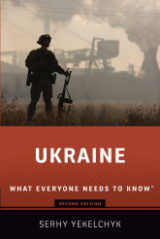
|
Ukraine : what everyone needs to know®Serhy Yekelchyk: Ukraine : what everyone needs to know®, New York : Oxford University Press, Incorporated ; [Ann Arbor] : Proquest, [2020] Conventional wisdom dictates that Ukraine’s political crises can be traced to the linguistic differences and divided political loyalties that have long fractured the country. However, this theory obscures the true significance of Ukraine’s recent civic revolution and the conflict’s crucial international dimension. The 2013-14 Ukrainian revolution presented authoritarian powers in Russia with both a democratic and a geopolitical challenge. In reality, political conflict in Ukraine is reflective of global discord, stemming from differing views on state power, civil society, and democracy. Ukraine’s sudden prominence in American politics has compounded an already-widespread misunderstanding of what is actually happening in the nation. In the American media, Ukraine has come to signify an inherently corrupt place, rather than a real country struggling in the face of great challenges. Ukraine: What Everyone Needs to Know® is an updated edition of Serhy Yekelchyk’s 2015 publication, The Conflict in Ukraine. It addresses Ukraine’s relations with the West, particularly the United States, from the perspective of Ukrainians. The book explains how independent Ukraine fell victim to crony capitalism, how its people rebelled twice in the last two decades in the name of democracy and against corruption, and why Russia reacted so aggressively to the strivings of Ukrainians. Additionally, it looks at what we know about alleged Ukrainian interference in the 2016 US presidential election, the factors behind the stunning electoral victory of the political novice Volodymyr Zelensky, and the ways in which the events leading to the impeachment proceedings against President Donald Trump have changed the Russia-Ukraine-US relationship. This volume is essential reading for anyone who wants to understand the forces that have shaped contemporary politics in this increasingly important part of Europe, as well as the international background of the impeachment proceedings in the US. (Verlagstext) Hinzugefügt am 25.03.2024
|